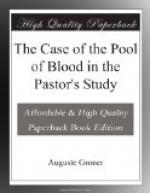It was a weird, sad Easter Monday. Even nature seemed to feel the pressure of the brooding horror, for heavy clouds piled up towards noon and a chill wind blew fitfully from the north, bending the young corn and the creaking tree-tops, and moaning about the straw-covered roofs. Then an icy cold rain descended on the village, sending the children, the only humans still unconscious of the fear that had come on them all, into the houses to play quietly in the corner by the hearth.
There was nothing else spoken of wherever two or three met together throughout the village except this dreadful, unexplainable thing that had happened in the rectory. The little village inn was full to overflowing and the hum of voices within was like the noise of an excited beehive. Everyone had some new explanation, some new guess, and it was not until the notary arrived, looking even more important than usual, that silence fell upon the excited throng. But the expectations aroused by his coming were not fulfilled. The notary knew no more than the others although he had been one of the searchers in the rectory. But he was in no haste to disclose his ignorance, and sat wrapped in a dignified silence until some one found courage to question him.
“Was there nothing stolen?” he was asked.
“No, nothing as far as we can tell yet. But if it was the gypsies —as may be likely—they are content with so little that it would not be noticed.”
“Gypsies?” exclaimed one man scornfully. “It doesn’t have to be gypsies, we’ve got enough tramps and vagabonds of our own. Didn’t they kill the pedlar for the sake of a bag of tobacco, and old Katiza for a couple of hens?”
“Why do you rake up things that happened twenty years ago?” cried another over the table. “You’d better tell us rather who killed Red Betty, and pulled Janos, the smith’s farm hand, down into the swamp?”
“Yes, or who cut the bridge supports, when the brook was in flood, so that two good cows broke through and drowned?”
“Yes, indeed, if we only knew what band of robbers and villains it is that is ravaging our village.”
“And they haven’t stopped yet, evidently.”
“This is the worst misfortune of all! What will our poor do now that they have murdered our good pastor, who cared for us all like a father?”
“He gave all he had to the poor, he kept nothing for himself.”
“Yes, indeed, that’s how it was. And now we can’t even give this good man Christian burial.”
“Shepherd Janci knew this morning early that we were going to have a new pastor,” whispered the landlord in the notary’s ear. The latter looked up astonished. “Who said so?” he asked.
“My boy Ferenz, who went to fetch him about seven o’clock. One of my cows was sick.”




